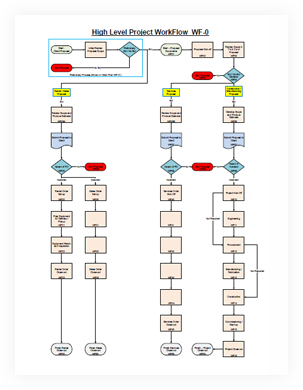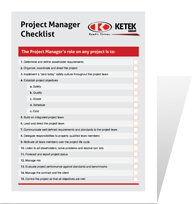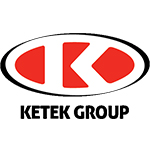
Project Managers Team
Ketek Group
A project manager’s role is probably the most important – and maybe the most challenging – in the entire project team. It requires attention to all kinds of details, strong communication and people skills, an appropriate amount of vision and maybe even a bit of superhero mojo. Sadly, many organizations do not recognize how important – and challenging – the project management role is and therefore set their projects up to fail. It is still common that project managers are appointed on a part-time basis, the assumption being they can manage the project as an addendum to their other duties. This is playing with fire. In practice, time may be shared with other responsibilities, but when it comes to the crunch, the project must get the attention it requires.
Before we get to the nitty-gritty of project management, I’d like to point out that project management is a team sport and it relies on the team’s players to be accountable for those aspects of the project that fall under their responsibility. This ethos must be passed down to all team members, irrespective of their level of involvement in the project.
But all teams need a leader, and when it comes to a project, that leader is the project manager. The PM will (hopefully) be there from the beginning, understand every aspect of the project, ensure communication is thorough and helpful, and see the project through to the end.
Technical
The technical dimension covers the hands-on role of the PM. He or she must be willing and able to get their sleeves rolled up and get stuck in the technical issues at a detailed level. Generally, this happens in the early, project-definition stages of the project. The project team will usually be at its leanest, and all members have to get involved in technical issues or the project will stall.
That is not to say that the PM needs to know how to do everyone’s tasks, but he or she needs to appreciate all the processes and be able to confidently challenge others at a level of informed understanding.
One helpful way of thinking about projects is to divide them into three spheres:
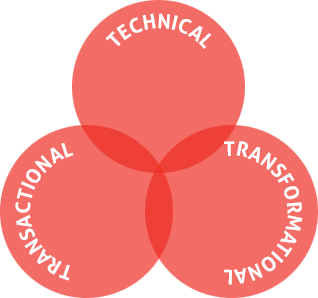
This is where the scope of the project will be developed and challenged, and the options evaluated. The technical aspects include those activities needed to complete the project definition, to implement the project appropriately, to control the project throughout and to assure quality of delivery.
The technical skills required of a PM will depend upon the nature of the project. The skills required to manage a technology driven project, for example, are different from those needed to supply off-the-shelf equipment to an industrial client.
Transactional
The transactional dimension refers to the activities associated with managing the project’s workflows and performance. Such activities would include establishing the project baseline metrics and parameters required to control the project during the implementation stage.
During the project implementation stage, transactional activities include regular control and reporting activities. Here the PM is performing foremost as a manager.

Project management is a team sport and an ethos of responsibility must be passed down to all team members, irrespective of their level of involvement in the project.
Transformational
The transformational dimension refers to activities associated with leadership. Here, the PM is acting as project Leader. Softer people, relationship and communication skills need to be put to work, seeking to get the best performance from the team. The objectives and benefits of the project are communicated here, and a vision of success will be developed.
This is where the best PMs spend the majority of their time. They realize that the return on their effort invested in the players vastly increases the chances of success.
This is also where PMs should be at their most effective. Regular development, maintenance and motivation of the team are essential if the project is to be successful.
“The devil is in the details” is the mantra of a good project manager. Take your eye off the details at your (and the project’s) peril!
PMs who grasp a project with passion and who create a sustained buzz about it create an environment where people want to be part of the team and end up talking about it years after completion.
The skills associated with the transactional and transformational dimensions are transferable across any industry or sector, and a PM should be selected based on overall skills, not because they are strong in the technology or service associated with the project. The best PMs are able to manage any project.
A well-informed understanding of the technology or service associated with the project can be quickly assimilated, but cultural and communication skills cannot; they take years of practice to develop. The most versatile PMs are therefore those skilled in the transactional and transformational dimensions, with have a proven track record of successfully delivering a range of projects.
Juggling The Three Dimensions
Suffice to say, the PM has to adopt all three of the project management dimensions every day. Depending on the phase of the project’s life cycle, more time may be spent on specific dimensions.
During the feasibility study, the PM spends proportionately more time in the technical and transformational dimensions. During the implementation stage, the PM is increasingly concerned with delivering the project as defined, and operates more in the transactional dimension. Transformational management skills will be employed as the team gets larger to communicate the vision and to motivate, encourage and guide team members, even when they’re outside their comfort zones.
For each project, the PM should identify and document the client’s responsibilities and the expectations of the two parties. These are the terms of reference against which success can be measured.
During the close-out stage, more time gets spent back in the technical and transactional dimension. Technical details are needed to complete the project and transactional control is needed to ensure the last project activities are completed properly and to schedule and cost.
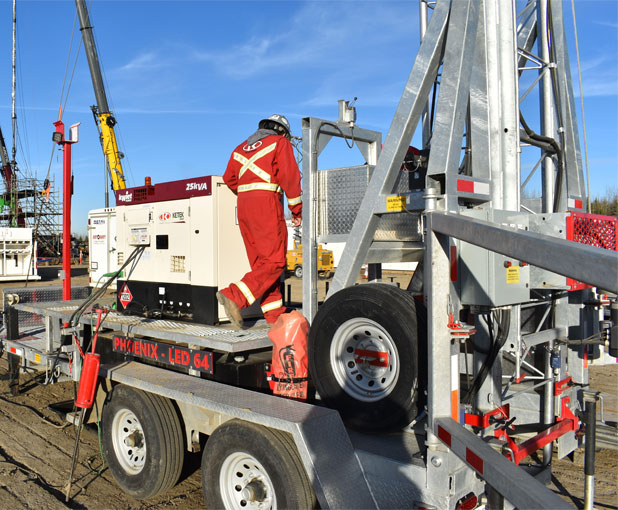
Project managers need strong communication and people skills, an appropriate amount of vision and maybe even a bit of superhero mojo.
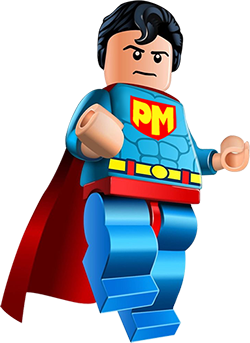
Are PMs superheros?
Possibly, but not necessarily. Arguably the best PMs are visionary leaders who give credit to the team during times of success and look inwards at themselves when things do not go as expected, looking for ways to improve for the future. Visionary leaders get a great sense of achievement and self satisfaction in enabling the team to succeed. Visionary leaders create an energized environment where people queue up to be part of the team.
I prefer to think of PMs as project leaders, because while “management” suggests a set process, “leadership” requires the selection of the best processes, identification of value-added activities and encouragement of all team players to overcome the inevitable challenges.
Project Manager Checklist
The Project Manager’s role on any project is to:
- Determine and define stakeholder requirements
- Organize, coordinate and direct the project
- Implement a “zero today” safety culture throughout the project team
- Establish project objectives:
- Safety
- Quality
- Scope
- Schedule
- Cost
- Build an integrated project team
- Lead and direct the project team
- Communicate well-defined requirements and standards to the project team
- Delegate responsibilities to properly qualified team members
- Motivate all team members over the project life cycle
- Listen to all stakeholders, solve problems and resolve conflicts
- Forecast and report project status
- Manage risk
- Evaluate project performance against standards and benchmarks
- Manage the contract and the client
- Control the project so that all objectives are met.
The PM also has a role to play in business development. During the course of a project, he/she should be vigilant for further business opportunities with the client and other parties.
Download Project
Manager Checklist
(PDF)

